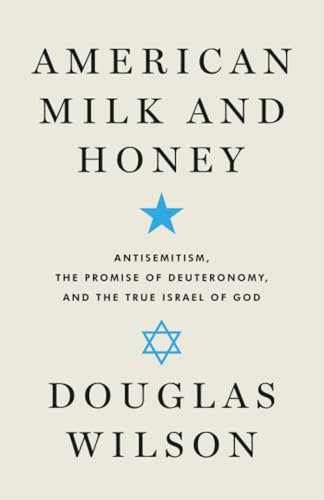There are parts of this book that are excellent. When Wilson is on, he's on. Several sections were very enlightening. And from the standpoint of volume, MOST of the book is very good. Wilson's treatment of the Deuteronomic blessings, American exceptionalism, and the Reformed understanding of the place of Israel in eschatological history fall into this category.
Wilson's strength has always been in translating biblical theology into language accessible to everyman.
The problem is that the PURPOSE of the book is to address modern American antisemitism, and I would give that part of the book one star. When you average the one star portion and the five star portions you should get three stars. But when the one star portion represents the primary purpose of the book, it must needs be weighted more heavily and it brings the whole thing down. When most of the apple pie ingredients are good, but the mustard powder is a bit off, it puts off the Yelpers.
Wilson takes a big hand over a small map and decrees that antisemitism is caused by envy. The Jews are a high performing people and low-performing people are envious of them and so they envy and hate. America has been blessed by a relative scarcity of antisemitism for much of our history because we've been a high-performing people not envious of other high-performing people. And the Europeans, who have been historically much more antisemitic, well they are either a historically low-performing people (ignore the cathedrals and the awesome architecture everywhere and the fact that America was founded by them...) or they're just haters.
This is a gross oversimplification of the issue. I noted in Wilson's "For Further Reading" no mention of Hilaire Belloc's The Jews, which is the best I've read on the subject. In the interwar period, Belloc noted a rise in antisemitism in Europe and sought--as a friend of the Jews--to document its complex causes (much more complex than simple envy...) and offer a prescription to prevent what he predicted would be a pogrom unlike the world had ever seen, well over a decade before the Holocaust.
Wilson offers none of this insight, so I'll provide it here. Since the days of the Roman empire:
1) The Jewish people have undergone a repeated pattern of expulsion, re-settlement, relatively peaceful co-existence, resentment, persecution/pogroms, and expulsion again.
2) Upon their settlement in a new country, they remain a distinct people but take the names of the hosts in such a way as to disguise themselves as just another member of the host nation.
3) Rather than being ultimately assimilated as would an Irishman or Italian living in a foreign land, for example, the Jew retains a distinct racial/cultural consciousness which makes the Jewish race always and everywhere a distinct nation within the borders of its host.
4) The Jew’s apparent natural propensity for certain skill sets (this is the one area Wilson sort-of deals with in calling them "high performance") coupled with his cultural bent towards certain activities leads him to ultimately ascend to high rank often within the domains of government, finance, media, the arts, and academia.
5) With no conspiratorial intent required, the aggregate behavior of this distinct Jewish minority in the domains mentioned previously leads him to have disproportionate influence over the soft means of power in any nation (diplomacy, finance, politics, etc.).
6) Because he remains a distinct people with a distinct set of interests, the divergence with the interests of the host nation grows and gradually becomes apparent.
7) Eventually, there is an ‘aha’ moment when the host nation masses awaken to the hitherto-unrecognized presence of a self-interested foreigner in their midst and the cycle of resentment, persecution, and expulsion repeats itself.
What is going on in America over the last few years has been a mass 'aha' moment. For years, people on the right have had a sense of being lied to by the secular media. This came to a head during the so-called pandemic, when the censorship became blatant, and the government was shown to be in bed with large corporations to push the accepted narrative. Out of this milieu arose the independent journalists who quickly found audiences eager for alternative narratives. Musk’s purchase of Twitter/X and his reinstatement of these dissenting voices opened the floodgates. On X, information is being shared outside the accepted channels and a whole bunch of aha-ing is going on.
And what we're going to see, I fear, is another outbreak of REAL antisemitism--not the lightweight variety DW is dealing with on his blog and on X, but the kind that results in kinetic violence.
Belloc also offered a recipe: light. Specifically around #2, above. Only by laying our cards on the table face up (on both sides) can we recognize that we are two distinct people with two distinct sets of interests, and that is the basis of fellowship and negotiation. Good fences make good neighbors.
It's all in Belloc, man. Skip this and read him.

